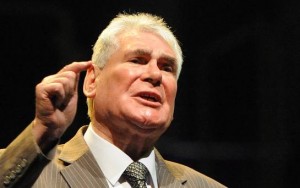In a welcome ruling, Judge Liam McNally has told Belfast Magistrates’ Court that Pastor James McConnell is “not guilty” of making “grossly offensive” remarks about Islam. Pastor McConnell was prosecuted under the 2003 Communications Act for an online sermon which called Islam “satanic” and ”one of the great evils in the world”.
Pastor McConnell leaves court pic.twitter.com/5f8XZ7UdWS
— Adrian Rutherford (@arutherfordNI) January 5, 2016
While the Judge agreed that the Pastor’s comments were “offensive”, he did not believe that they were “grossly offensive”; he added that courts need to be “very careful not to criticise speech which, however contemptible, is no more than offensive….It is not the task of the criminal law to censor offensive utterances.” It would be, to say the very least, helpful to have clearer guidelines on the difference between “offensive” and “grossly offensive” speech. But the ruling is, overall, welcome.
It was bizarre decision to take a preacher to court for describing another religion as “Satanic”. Those of us who are from fundamentalist backgrounds will recall hearing all manner of practices condemned as “Satanic.” Alcoholic beverages were disparaged as the “devil’s vomit”; timewasting was the devil’s work. Yet pub-landlords and Play-Station owners did not take preachers to court for hate-speech. Such sermons were clearly influenced by New Testament rhetoric. One is either of the kingdom of darkness or the kingdom of light; if you are not for Jesus you are against him.
 Still, Pastor McConnell should have been much more circumspect in many of his remarks. He had indicated in his sermon that he agreed with the late MP Enoch Powell’s infamous “River’s of Blood” speech: a speech which criticised mass- immigration in language most consider alarmist. The Pastor also seemed to suggest that Muslims were untrustworthy (although he later clarified that he was only referring to those Muslims who use their religion as justification for violence).
Still, Pastor McConnell should have been much more circumspect in many of his remarks. He had indicated in his sermon that he agreed with the late MP Enoch Powell’s infamous “River’s of Blood” speech: a speech which criticised mass- immigration in language most consider alarmist. The Pastor also seemed to suggest that Muslims were untrustworthy (although he later clarified that he was only referring to those Muslims who use their religion as justification for violence).
As we have repeatedly argued on this site, civility is a Christian virtue. It is true that some of the sermons in the New Testament use abrupt, harsh language. But Paul did not begin his sermons in Lystra and Athens by demonising idolaters. And Jesus did not compare the religion of the Samaritans or the pagans who lived in the Decapolis as “satanic”. He did, however, use such language to describe hypocrites within his own religion and to rebuke his own disciples. Our most ferocious language must be retained for self-criticism.
True freedom of religion demands more than freedom from legal discrimination. Christians believe that we need to be transformed inwardly if we are to truly worship God; outward conformity means nothing in the absence of sincere belief. To have genuine religious freedom, we must be able to freely choose the beliefs and values we live by. Religious minorities must not be brought under social pressure to conform to other norms.
Furthermore, Christians believe that everyone has a right to a quiet and peaceful life. While freedom of religion depends upon freedom of speech, free-speech must be balanced against an individual’s right to be free from harassment and fear. In other words, we must not cause others needless anxiety, inconvenience or annoyance. So it is morally wrong to suggest that a particular religious minority cannot be trusted or that their presence in the United Kingdom could lead to “rivers of blood.”
So Pastor McConnell was correct to publicly apologise for unintentionally hurting or offending Muslims. Others now need to apologise for the chilling effect this needless prosecution could have on free-speech. No one will want to criticise any religion too harshly if the result could be criminal charges. And both sides of this debate need to apologise for treating Islam as one monolithic entity, with one conception of jihad, one definition of blasphemy, one voice and one set of sensitivities.
Secular well-wishers do Islam no favours when they mentally place all Muslims in one set and assume that every member of that set will be enraged by a sermon denouncing Islam. On the contrary, several Muslims spoke in Pastor McConnell’s defence. The same naïve secularist thinking insists that every Muslim must be protected from radicalisation. Simply belonging to the reference class makes you a threat to society.
It should go without saying that thoughtful Muslims understand that “freedom of expression” is a moral challenge as well as a political freedom. They know that in a free society we must learn to speak with maturity and charity even though the law does not compel us to. They appreciate that democratic freedoms are not an invitation to decadence; they demand tolerance and virtue. If the state does not force us to live wisely and in peace we must do so of their own accord. Liberal democracies place greater demands on the believer, not less, and they are places where faith can flourish.
If an open society is to survive we must agree that it is good to freely choose our beliefs, to subject them to criticism and to build a home with the very neighbours who have criticised us. We must tolerate those who overstate their case and live with hurtful language. For liberal democracy is not merely a set of rules; it is a moral challenge to turn the other cheek and to seek the good for everyone who lives in our city.
